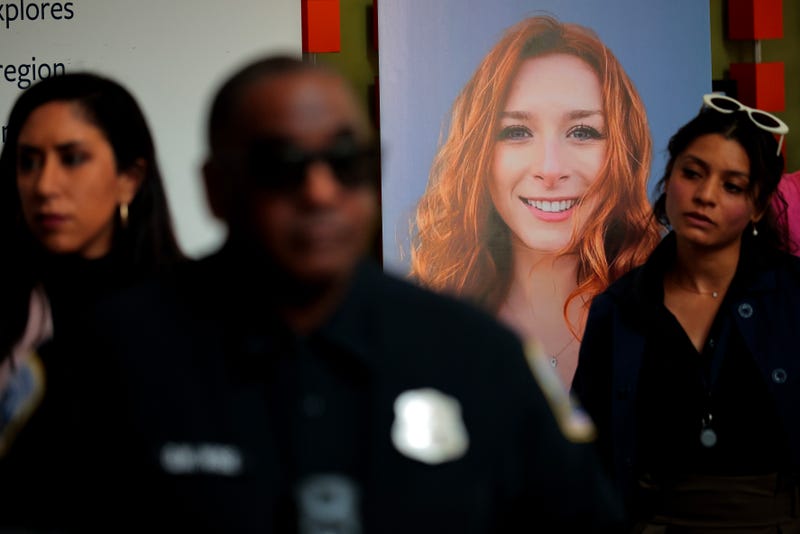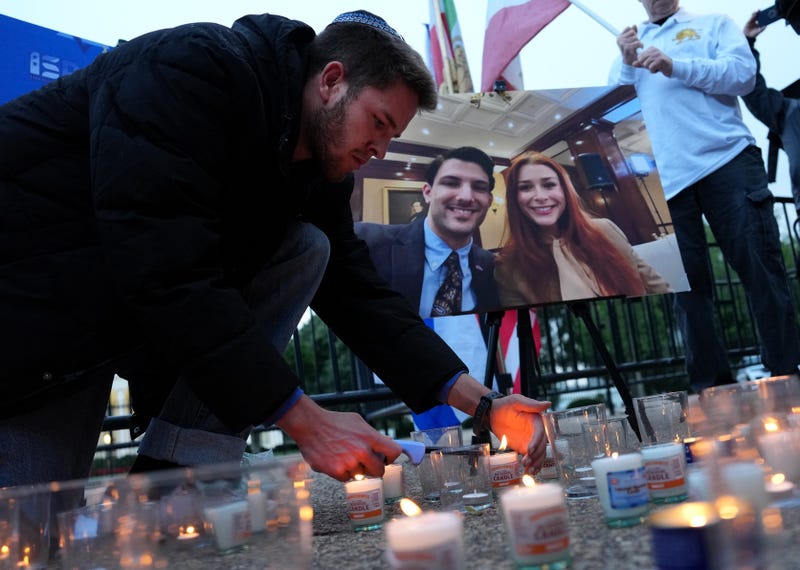
In May, two staff members of the Israeli Embassy in Washington — a young couple on the verge of becoming engaged — were fatally shot while leaving an event at a Jewish museum, and the suspect yelled, “Free, free Palestine” after he was arrested, police said.
The victims were identified as Yaron Lischinsky, an Israeli citizen, and Sarah Milgrim, an American woman — a young couple about to be engaged. The family of Sarah Milgrim spoke to CBS News' and WCCO-TV's Jonah Kaplan this week, and remembered Sarah as a courageous, strong women who was striving for peace.
Wednesday, WCCO Radio's Drivetime with DeRusha spoke to Kaplan about the deeply moving interview he did with the parents of Milgrim as the rise in antisemitic violence around the U.S. seems to be on the rise.
Here is their conversation.
Jason DeRusha: Understanding a little bit more about Sarah and, and for people who maybe don't remember all of the details, but Sarah was, really executed in what you could certainly call a terror or a hate attack, outside of the Jewish Museum in D.C. Sarah and her fiancé were both workers at the Israeli Embassy, right?
Kaplan: They were both workers at the Israeli Embassy, but we have to, I think, make a point to say the shooter didn't know that. The shooter and the gunman showed up at a Jewish museum. And that was the motivator. And I think in all of these events, they're not asking, you know, if you look at antisemitism in history, this isn't really about religion, right? They're not asking who you believe in, you're not asking about do they keep kosher, they're not asking about how often they go to synagogue. They're associated with the Jewish people, they're associated with the Jewish state, that's enough, they should be killed. And that's exactly what happened.
And for many members of the Jewish community, certainly in the Twin Cities, across the Upper Midwest, across the country, around the world, Sarah and Yaron's death were personal because it could have been any one of us. And when we think about what happened in Boulder, a walk for the hostages to raise awareness, that walk happens every week around a Minneapolis-area lake. Every week. And for security purposes, I won't say where and when it is, but it happens. And so, These are not isolated incidents. And this has been brewing, sadly for a long time.
DeRusha: You feel this personally, right? You're the son of two rabbis. I mean, you understand sort of the fear and I assume - I don't want to assume, but I'm going to guess - you've been on the receiving end of hate?
Kaplan: Well, thank God I think America is still a beacon of light in the world. And I think if we think about comparing, let's say this time, you know, the Governor of Pennsylvania is firebombed, rescue crews are going to help him. EMS crews are going to help and try to save victims of these attacks in Boulder and in Washington D.C. In the Holocaust, remember, they sat back and watched as synagogues burned. So there's no comparison in that sense.
There is definitely, though fear. There's definite fear among Jewish communities, that is why there is heightened security at every Jewish institution. You will not find a Jewish institution in the Twin Cities, really anywhere in the country, without an armed guard. That includes preschools.

DeRusha: Tell me, how did you get Sarah's parents to speak with you?
Kaplan: Well, another good question, Jason, because at the surface, what does a Minnesota reporter have to do with any of this? They're not from here, this didn't happen here, totally irrelevant on the surface. But again, as I mentioned, this could have been any, this was personal for the Jewish community, and I'm grateful that CBS asked me for my efforts on this.
And look, in any kind of reporting that we do, whether it's someone who survived a tornado, whether it's someone who survived a car crash, whether it's someone who's struggling to make ends meet or they can't pay for their health care, you appeal to their humanity. And you try to find ways where we say, 'let's work together to raise awareness.' And let's try to lift the spirits and lift the, in this case, political and historical literacy among our societies. And so when I reached out to the Milgrams, I said, 'look, yes, journalism is what I do, but who I am, I was a member of the Jewish community and I'm also the father of three daughters. And Sarah, she's now going to be a wonderful role model for them. And Bob Milgram called me back and said, 'look, we've received a lot of messages, a lot of invitations to interview and your message really touched us. And I think journalists of any outlet, in any city, covering any topic, we need to return to those roots of humanity, of acknowledging and validating pain and perspective. And assuming that responsibility and taking it seriously to communicate that with our viewers and listeners and readers.
DeRusha: Especially now, you look at the way that so many people react towards journalists and media in general, and some of that is our own fault in the media for not leaning into that human side of our existence.
Kaplan: And what's the point of it, Jason? Are, are we putting them on TV just to see them cry? No. What can we learn from this? What are the takeaways? What are the lessons? Not just about looking back, but what does this mean moving forward? How do we prevent the next tragedy? We're never going to cure antisemitism. You know, there's that old Jackie Mason joke, three constants in life - death, taxes, and antisemitism. But how can we educate people about the nuance, about the history, so that when you hear some of the old stereotypes or you hear now some of the chants in these rallies and protests and encampments, what do they mean? Are you really antiwar or are you just being antisemitic?
DeRusha: What was the biggest takeaway, the biggest thing that will sit with you that came from Sarah's parents?
Kaplan: There's so much that sits with me. I think about the remarkable soul that she was. I think about the love story that she had, and that I identify with, falling in love with the land of Israel, not necessarily the State of Israel, but there's a Jewish connection to that land. That wanting to see peace in that region, to understand other people's plight, to increase dialogue. And I'm really going to lean in to just that identity. No matter what I think to myself, and I tell us, we talk amongst our community members. Everybody says, 'speak out, speak out.' I said, not just speak out, show up, show up. You know what anti-Semites really hate? More proud Jews. And we want to be that light to the nations. Do you have a question about something? Ask. Read, learn the history of this strip of land that is at the center of a number of continents and that has been tossed around, empires and other kinds of kingdoms, like a hot potato. It goes back thousands of years. We've got to read up on that. And critical issues require critical thinking. And I think we have a crisis in this country about that. Whether that starts in higher education or earlier, or whether it breaks down later, we'll take another 10 minutes and another show, but we gotta start somewhere.
